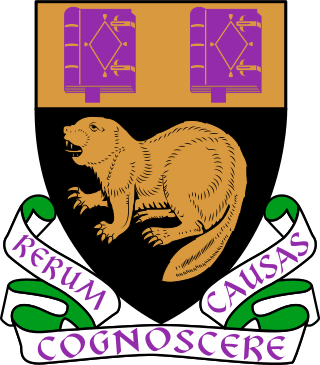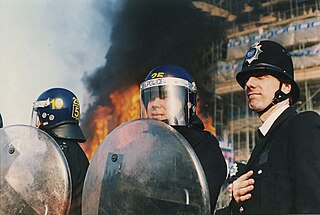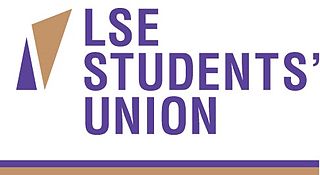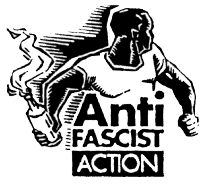
The London School of Economics and Political Science (LSE) is a public research university in London, England, and a member institution of the University of London. Founded in 1895 by Fabian Society members Sidney Webb, Beatrice Webb, Graham Wallas and George Bernard Shaw, LSE joined the University of London in 1900 and established its first degree courses under the auspices of the university in 1901. LSE began awarding its degrees in its own name in 2008, prior to which it awarded degrees of the University of London. It became a university in its own right within the University of London in 2022.

London Stock Exchange (LSE) is a stock exchange in the City of London, England, United Kingdom. As of August 2023, the total market value of all companies trading on the LSE stood at $3.18 trillion. Its current premises are situated in Paternoster Square close to St Paul's Cathedral in the City of London. Since 2007, it has been part of the London Stock Exchange Group. The LSE is the most-valued stock exchange in Europe as of 2023. According to the 2020 Office for National Statistics report, approximately 12% of UK-resident individuals reported having investments in stocks and shares. According to the 2020 Financial Conduct Authority (FCA) report, approximately 15% of UK adults reported having investments in stocks and shares.

The Anarchist Federation is a federation of anarcho-communists in Great Britain. It is not a political party, but a direct action, agitational and propaganda organisation.

The Solidarity Federation, also known by the abbreviation SolFed, is a federation of class struggle anarchists active in Britain. The organisation advocates a strategy of anarcho-syndicalism as a method of abolishing capitalism and the state, and describes itself as a "revolutionary union". In 1994 it adopted its current name, having previously been the Direct Action Movement since 1979, and before that the Syndicalist Workers' Federation since 1950.

Anarchism in the United Kingdom initially developed within the religious dissent movement that began after the Protestant Reformation. Anarchism was first seen among the radical republican elements of the English Civil War and following the Stuart Restoration grew within the fringes of radical Whiggery. The Whig politician Edmund Burke was the first to expound anarchist ideas, which developed as a tendency that influenced the political philosophy of William Godwin, who became the first modern proponent of anarchism with the release of his 1793 book Enquiry Concerning Political Justice.

The poll tax riots were a series of riots in British towns and cities during protests against the Community Charge, introduced by the Conservative government of Prime Minister Margaret Thatcher. The largest protest occurred in central London on Saturday 31 March 1990, shortly before the tax was due to come into force in England and Wales.

The London School of Economics Students' Union is the representative and campaigning body for students at the London School of Economics (LSE). Like other students' unions, it also funds and facilitates student activities of campus, including societies, sports clubs through the Athletics Union (AU), the Media Group, and Raising and Giving (RAG) charitable fundraising initiatives.
Anarchism in Nigeria has its roots in the organization of various stateless societies that inhabited pre-colonial Nigeria, particularly among the Igbo people. After the British colonization of Nigeria, revolutionary syndicalism became a key factor in the anti-colonial resistance, although the trade union movement deradicalized and took a more reformist approach following the country's independence. The contemporary Nigerian anarchist movement finally emerged from the left-wing opposition to the military dictatorship in the late 1980s and saw the creation of the Awareness League.

Ian David Bone is an English anarchist and publisher of anarchist newspapers and tabloids, such as Class War and The Bristolian. He has been involved in social campaigns since the 1960s, including the 2001 "Vote Nobody" election campaign.

Communization theory refers to a tendency on the ultra-left that understands communism as a process that, in a social revolution, immediately begins to replace all capitalist social relations with communist ones. Thus it rejects the role of the dictatorship of the proletariat, which it sees as reproducing capitalism. There exist two broad trends within communization theory: a ‘Marxist’ one and an ‘anarchist’ one.

Anti-Fascist Action (AFA) was a militant anti-fascist organisation, founded in the UK in 1985 by a wide range of anti-racist and anti-fascist organisations.

The Free Union or Free League is an anarchist organisation in the Netherlands and Belgium that was founded in 1990. The Free Union originated from the Business organization Collective Sector (BCS) and the Independent Union of Business Organizations (OVB) in the 1980s.

The People's Assembly Against Austerity is a political organisation based in the United Kingdom that was originally set up to end and reverse the country's government-instituted austerity programme.
Anarchism in Tunisia has its roots in the works of the philosopher Ibn Khaldun, with the modern anarchist movement being first brought to the country in the late 19th century by Italian immigrants. The contemporary anarchist movement arose as a result of the Arab Spring and the aftermath of the Tunisian Revolution.

The Anarchist Black Cross (ABC), formerly the Anarchist Red Cross, is an anarchist support organization. The group is notable for its efforts at providing prisoners with political literature, but it also organizes material and legal support for class struggle prisoners worldwide. It commonly contrasts itself with Amnesty International, which is concerned mainly with prisoners of conscience and refuses to defend those accused of encouraging violence. The ABC openly supports those who have committed illegal activity in furtherance of revolutionary aims that anarchists accept as legitimate.

Lisa Louise McKenzie is a British anarchist and senior lecturer at the University of Bedfordshire whose work relates to class inequality, social justice, and British working class culture. She was active in the Class War party and her research and politics have been influenced by being a working-class mother of a mixed-race child in a poor area of Nottingham where she grew up.

Anarchism in Indonesia has its roots in the anti-colonial struggle against the Dutch Empire. It became an organized movement at the behest of Chinese anarchist immigrants, who played a key part in the development of the workers' movement in the country. The anarchist movement was suppressed, first by the Japanese occupation of the Dutch East Indies, then by the successive regimes of Sukarno and Suharto, before finally re-emerging in the 1990s.
Anarchism in Latvia emerged from the Latvian National Awakening and saw its apex during the 1905 Russian Revolution. Eventually the Latvian anarchist movement was suppressed by a series of authoritarian regimes in the country.
Anarchism in Croatia first emerged in the late 19th century within the socialist workers' movement. Anarchist tendencies subsequently spread from neighboring countries, taking root in a number of cities throughout the country. The movement experienced repression from a succession of authoritarian regimes before finally reemerging around the time of the independence of Croatia.

libcom.org is an online platform featuring a variety of libertarian communist essays, blog posts, and archives, primarily in English. It was founded in 2005 by editors in the United States and the United Kingdom. Libcom.org also has a forum and social media features including the ability to comment on post and upload original articles. In contrast with traditional archives, anarchistic archival practices embrace "use as preservation", making use of digital technology to host niche political material in online repositories like Libcom.org.


















